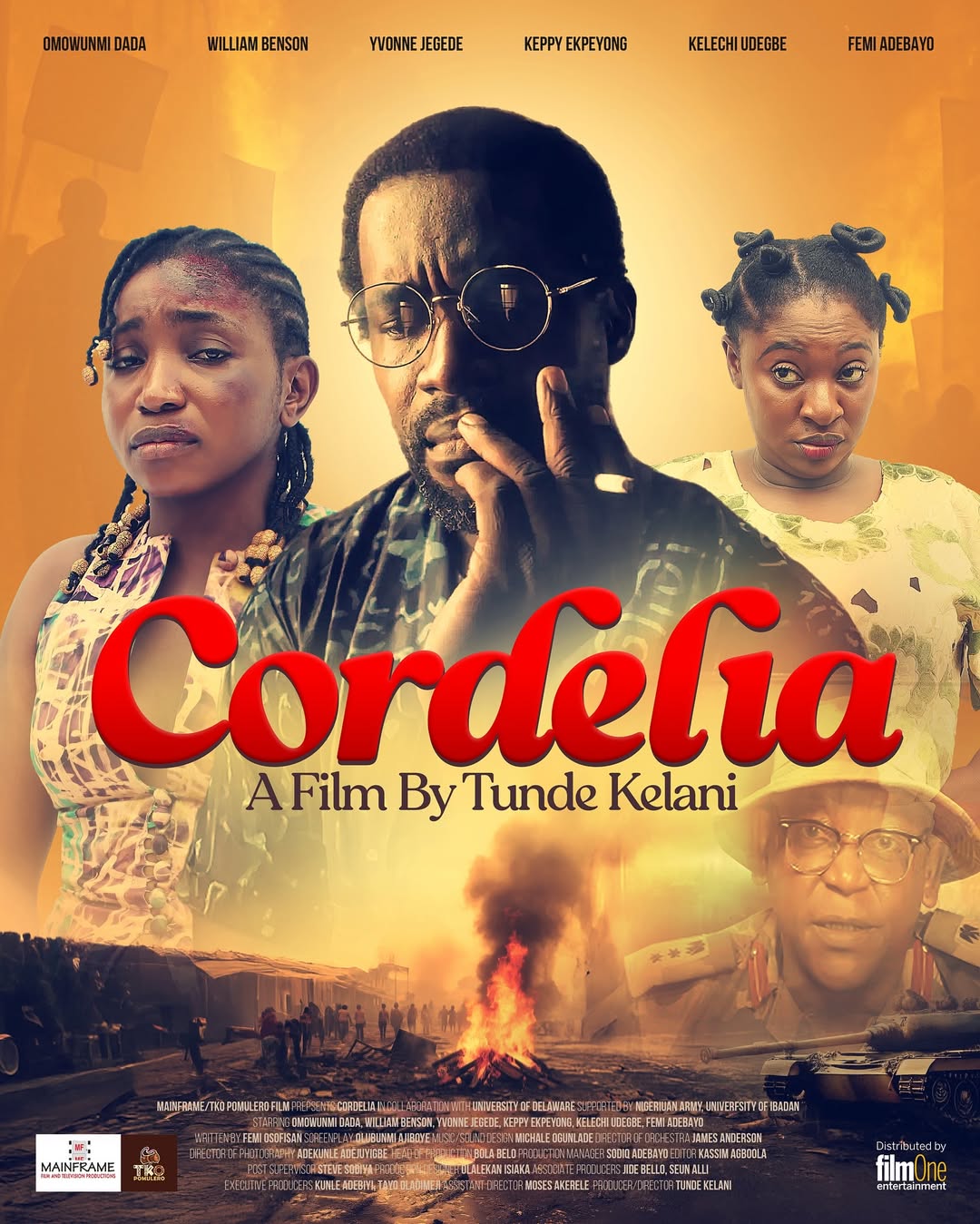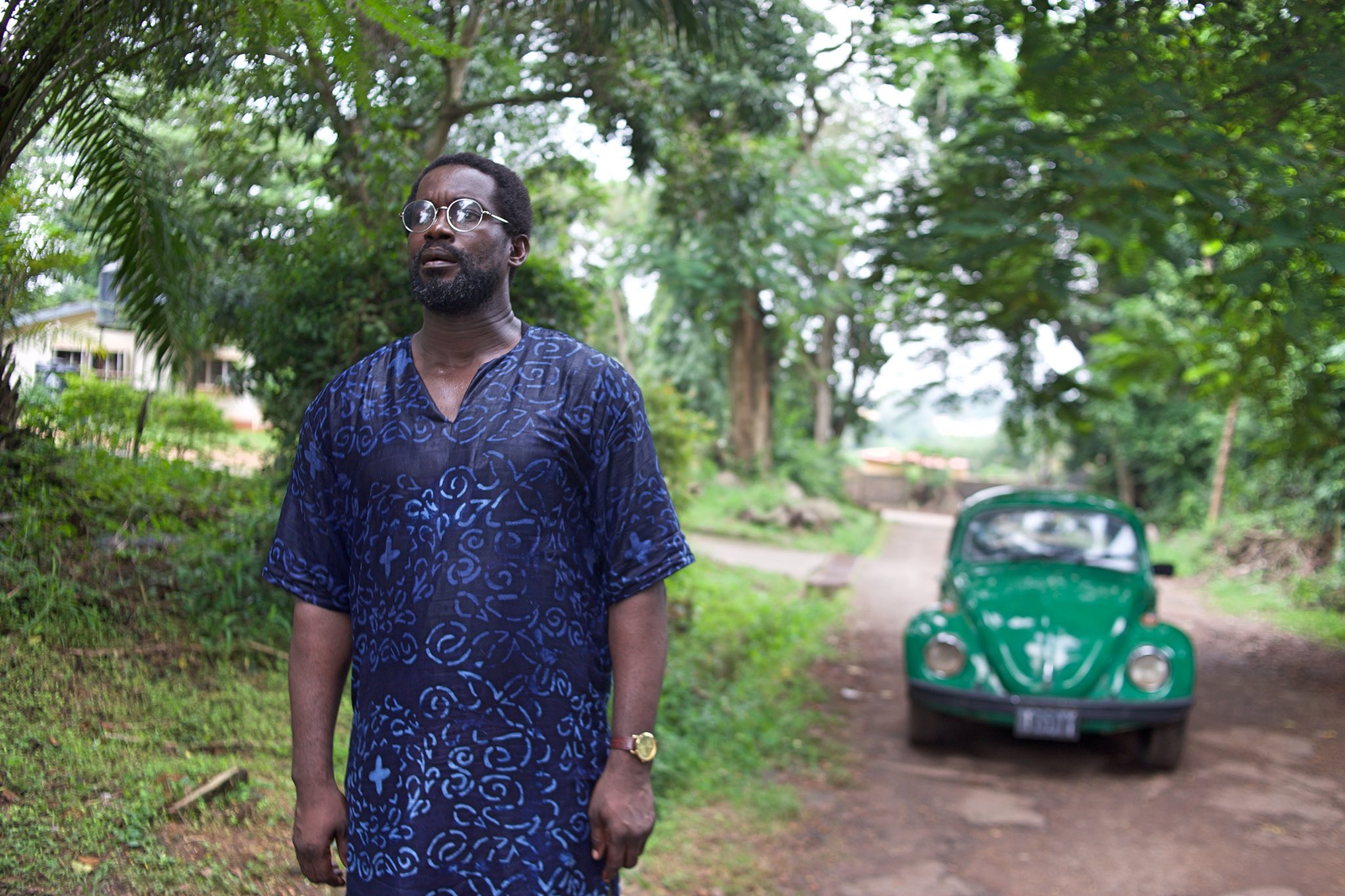For all its polish, Cordelia is ultimately a quiet film about a loud era, and that tension — between what the period demands and what the film delivers — is what makes it both intriguing and unsatisfying.
By Joseph Jonathan
Tunde Kelani is one of the few filmmakers in Nollywood who has cultivated a distinct style through his screen adaptations of Nigerian novels and plays. Over the years, he has brought to life works such as Koseegbe (1995), O le ku (1997), White Handkerchief (1998), Thunder Bolt: Magun (2001), The Narrow Path (2006), Maami (2011), and Dazzling Mirage (2014). Following in that tradition, his latest offering since Ayinla (2021), Cordelia, is an adaptation of Femi Osofisan’s novella of the same title.
Cordelia is the kind of film that tests your patience, not because it’s slow — slowness, in cinema, can be a virtue — but because it seems to confuse minimalism for depth. The film unfolds in 1990s Nigeria, a period charged with the menace of military coups, student protests, and national instability.
Yet, what should have been an emotionally searing exploration of love under political duress often drifts into a polite, almost overly mannered exercise, unwilling to push its drama to the edge. Kelani, one of Nigeria’s most respected filmmakers, has earned the right to be unhurried, but here the deliberateness sometimes feels less like discipline and more like a reluctance to engage with the messier possibilities of his material.

The central story is a promising one. Professor Adekunle (William Benson), is a man in a slow-motion personal collapse, burdened by a marriage on life support and a career overshadowed by disillusionment. His life shifts when Cordelia (Omowunmi Dada), a student and the daughter of a colonel entangled in a coup, seeks refuge in his home.
This premise has all the potential for taut political drama and character study: a man forced to weigh his safety against his conscience, a woman whose mere presence is an invitation to danger, and the shadow of a nation in turmoil pressing against their every choice. But instead of tightening the screws, Kelani loosens them, allowing the story to drift in long stretches of polite conversation and moments that linger without ever landing.
William Benson’s Professor Adekunle is a study in restraint, which works for a character meant to embody quiet moral struggle. His face, often caught in stillness, suggests an internal negotiation between action and self-preservation. But while Benson maintains this quiet authority, the performance occasionally risks flattening into monotony, a calm so unwavering it begins to read as passivity.
Omowunmi Dada’s Cordelia, in contrast, radiates energy — she is warm, present, and emotionally transparent. Yet, that very transparency sometimes clashes with the story’s muted tone, as if her character wandered in from a more emotionally direct film. The chemistry between the two leads never quite clicks; they exist beside each other rather than with each other, and the screenplay doesn’t help, giving them exchanges that skim over tension instead of digging into it.
The real pulse of the film comes from Yvonne Jegede as Remi, Adekunle’s estranged wife. Jegede plays the character with the sharpness of someone who knows she has been wronged but is too proud to collapse in public. Her piano scene is the closest the film comes to raw emotional revelation, and it’s telling that it comes not from the titular character but from a secondary one.
Keppy Ekpenyong’s Colonel Nwanze is equally commanding, delivering lines with a measured weight that conveys authority without shouting. Even in a scene where the dialogue pacing falters, Ekpenyong manages to hold the frame, masking missteps with veteran skill. Still, the interplay between the professor, Remi, and Cordelia feels structurally shaky, as if the script cannot quite decide whose story it is telling.
Where Cordelia shines is in its surface beauty. Adekunle “Nodash” Adejuyigbe’s cinematography cloaks the film in a nostalgic glow, giving faces and interiors a softness that feels almost tactile. Rooms look lived-in, with details that suggest history without announcing it — books leaning against each other on a shelf, a radio that seems to hum even when it’s off.
This visual richness, however, sometimes exposes the narrative thinness. You can feel the craft in the framing, the patience in the lighting, but you’re left waiting for the emotional core to match the elegance of the image.

The same can be said of the film’s score. It is subdued, almost shy, tracing the emotional contours without dictating them. There is a quiet confidence in the way the music refuses to overstate, a quality the film shares, but at times, this restraint feels like an avoidance of emotional commitment. The one musical misstep is a dubbed singing scene between Adekunle and Remi, which sits awkwardly in a film so otherwise careful about tone.
The deeper problem with Cordelia lies in its approach to political history. The 1990s were not merely a backdrop of coups and curfews; they were years in which the boundaries between public and private life dissolved under the pressure of fear.
Yet, in Kelani’s telling, the political climate feels like a hazy suggestion rather than a lived reality. The coup is present in the plot but absent in its urgency; the student riot is seen but never truly felt. These events should churn beneath the characters’ every decision, tightening the drama. Instead, they are treated like passing clouds, acknowledged but never allowed to cast real shadow.
This choice, to keep the politics understated, is not inherently wrong. There is merit in exploring the private reverberations of public events, in showing how the quiet corners of life absorb the tremors of national upheaval. But subtlety requires precision, and here the precision wavers.
The film often lingers too long in spaces where the dramatic stakes are low, creating an atmosphere that is reflective without being especially revealing. You sense that there are rich inner lives beneath these characters, but the film seems unwilling to dig deep enough to let us see them.
It’s possible that Kelani intends this distance as a statement in itself: that in an era when danger could arrive without warning, people became cautious even in their intimacies, choosing silence over exposure. If so, Cordelia is a faithful evocation of that emotional climate. But cinema is not obliged to mimic life’s reticence; it has the power to make the unspoken resonate. Here, too much remains simply unspoken, not transformed into something that compels.
By the final scenes, what lingers is not the sweep of history or the force of romance, but the mood — a gentle, melancholy hum that never rises to a crescendo. This may be enough for viewers who value atmosphere above plot, who enjoy a film that asks them to lean in and piece things together. For others, it will feel like an opportunity missed: a film with the pedigree, the cast, and the historical weight to be extraordinary, but one that chooses to remain quietly respectable instead of risking emotional or political boldness.
Cordelia is, in the end, a film of halves — half romance, half political drama, half confession, half withholding. It contains moments of beauty and moments of truth, yet they are scattered, never building into a sustained force. Kelani’s craftsmanship is evident in every frame, and the performances, at their best, are layered and nuanced. Still, the film feels like a portrait left unfinished: the outlines are present, the shading is meticulous, but the colours remain unfilled.

Perhaps this is intentional, a reflection of a period when nothing felt complete and everything was suspended. Or perhaps it is simply a case of a story that needed more urgency, more heat, to match the temperature of the times it depicts.
For all its polish, Cordelia is ultimately a quiet film about a loud era, and that tension — between what the period demands and what the film delivers — is what makes it both intriguing and unsatisfying. It is worth seeing, if only to witness a filmmaker of Kelani’s stature take a measured, almost minimalist approach to politically charged material. But it is also a reminder that restraint, without the counterweight of intensity, can leave a story adrift. The slow burn is there; the spark that would make it catch fire never quite arrives.
Rating: 2.9/5
Joseph Jonathan is a historian who seeks to understand how film shapes our cultural identity as a people. He believes that history is more about the future than the past. When he’s not writing about film, you can catch him listening to music or discussing politics. He tweets @JosieJp3.




